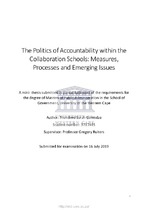| dc.description.abstract | At the beginning of 2016, the Western Cape Education Department (WCED) initiated a public-private partnership called the Collaboration Schools Pilot Project (CSPP). This pilot targets underperforming schools bringing in private partners that provide the schools with additional funding, support and new governance structures. There are significant implications for accountability in this new model. This exploratory thesis seeks to unpack the ways in which accountability is conceived of and practised within the collaboration schools model, in order to explore the emerging conflicts. Its main data is drawn from legal contracts between the state and other parties, as well as interviews with key actors. The contracts included service level agreements between the WCED, the school operating partner (SOP) and the school, and the memorandum of understanding between the WCED and the donor partner. The key actors interviewed included WCED representatives at various levels, principals from collaboration schools, SOP representatives, a donor representative and representatives from Equal Education Law Centre. Data was analysed through the lens of Newman’s dimensions of accountability, asking the questions, ‘accountability by whom, for what, to whom and by what means’. The study revealed several accountability issues, both within the contracts as well as in the on-the-ground experiences of key actors. These included a lack of clarity regarding fundamental roles and responsibilities of the different parties involved, insufficient mechanisms to hold parties accountable, significant imbalances of power between the parties involved rendering accountability difficult, democratic accountability deficits, the problematic expansion of the private sector into public education (further than implied in the model’s conception) and a number of legislative issues. In summary, the collaboration school model has major accountability deficits. While the project is currently in its pilot phase and limited to a few schools, it should be noted that if the model is rolled out as the key documents suggest it will be, these deficits could have far-reaching political implications. | en_US |

